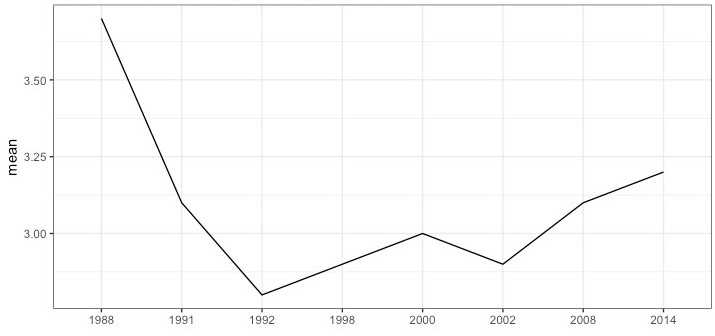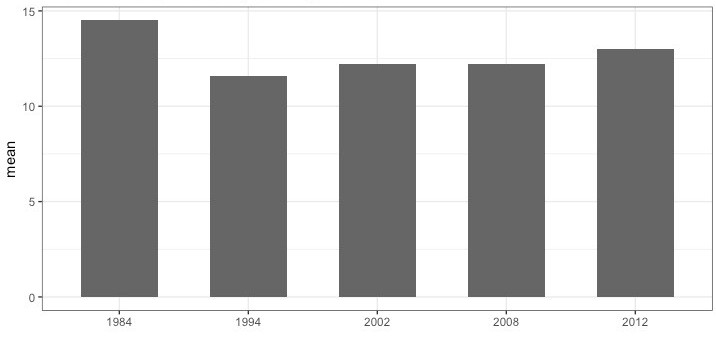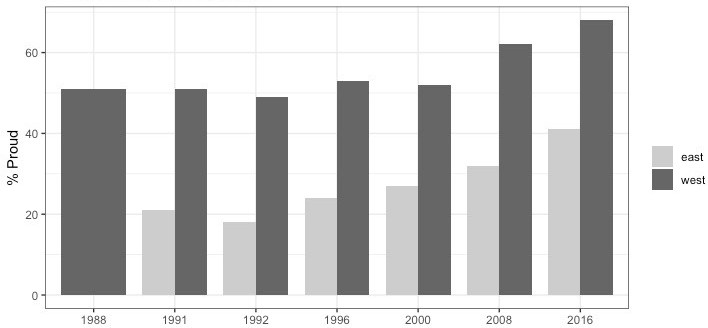 Recent decades have been associated with declining public trust in democratic institutions across Europe. Drawing on new research of German public attitudes, Ross Campbell illustrates that this picture may be more complex than is generally recognised. Although satisfaction with democracy and trust in democratic institutions declined sharply following German reunification in 1990, public criticism of institutions and the functioning of democracy was accompanied with growing support for the constitution (Basic Law).
Recent decades have been associated with declining public trust in democratic institutions across Europe. Drawing on new research of German public attitudes, Ross Campbell illustrates that this picture may be more complex than is generally recognised. Although satisfaction with democracy and trust in democratic institutions declined sharply following German reunification in 1990, public criticism of institutions and the functioning of democracy was accompanied with growing support for the constitution (Basic Law).
During the latter part of the 20th Century, academic research uncovered a number of important changes in individuals’ evaluations of democracy. Amongst the most widely cited trends was that trust in democratic institutions eroded, signalling the onset of a more adversarial relationship between citizens and the state.
Yet there were others. Attachments to political parties diminished in number and faded in intensity, creating a fluidity in electoral behaviour, the long-term consequences of which have challenged forms of democracy premised upon strong elite-mass linkages. In addition, satisfaction with democracy reduced, as people became less enamoured with the everyday functioning of democracy. And the symptoms were not confined to the nation-state: disaffection became equally manifest towards EU elites, structures and processes of engagement. Overall, then, from the basic institutions and mechanisms of government, to its day-to-day functioning and personnel, public images presented a formidable challenge to democracy.
What should be done? Some have suggested that democracy should be redesigned, shifting the discussion from the analysis of empirical trends to the evaluation of alternatives claiming to provide more effective channels of mass input. On this reasoning, one reason why democracy suffers from deficits of ‘input legitimacy’ is that people have limited opportunities to bypass partisan interests and press decision-makers directly to realise their political preferences. Institutional rigidity thus inhibits meaningful representation and curtails substantive accountability. Hence, scholars argue that participation should be extended, horizontal structures created and the workings of the system flattened through decentralised forms of decision-making. The cure to political disaffection, then, lies in widening and deepening democracy. In the words of the late German Chancellor, Willy Brandt, we should ‘risk more democracy’ (mehr Demokratie wagen).
Although there are strong normative arguments against this line of approach, this article argues that the underlying empirical premises of low (or falling) support are not straight-forward. I present evidence from a systematic analysis of German political attitudes. This demonstrates that Germans did not become cynically rejecting of democracy but ‘critically democratic’; i.e., their criticism of institutions and the functioning of democracy was accompanied with growing support for the constitution (Basic Law). As such, the evidence for democratic reform may not be as compelling as has hitherto been assumed. I use data collected from the German General Social Survey (ALLBUS).
Figure 1: Satisfaction with democracy in Germany (1988-2014)

Note: The mean has been graphed on a 0-5 scale, where 0 denotes ‘very dissatisfied’ and 5 denotes ‘very satisfied’. Source: ALLBUS (1988-2014)
The starting point is to examine what happened to German views of democracy. Overall, the evidence suggests that support did not collapse irretrievably. There has been decline and restoration. As shown, satisfaction with democracy (figure 1) declined sharply in the period following unification in 1990 and remained low for some considerable time thereafter. Indeed, its decline defined the pattern of support well beyond unification. Further, trust in Germany’s democratic institutions also fell (figure 2).
In the aftermath of unification, then, Germans revised and lowered their support for core aspects of the political system. But there has been a recovery. Indeed, the most recent evidence shows that Germans are more trusting of democratic institutions and more satisfied with democracy than at any point since unification. Notice, too, that the time frame encompasses federal elections (1990, 1994, 2002) and elections in which there were changes of government (1998, 2005, 2009 and 2013). Since these do not lead to injections of support, this suggests that the drivers of support are not exclusively or principally political.
Figure 2: Trust in democratic institutions in Germany (1984-2012)

Note: The figure shows the combined trust in four of Germany’s institutions: the Constitutional Court, the Judiciary, the Parliament and the Federal Government. Trust for each institution is measured on a 0-5 scale where 0 denotes ‘no trust at all’ and 5 denotes ‘a great deal of trust’. The combined scores thus range from 0-20. Source: ALLBUS (1984-2012)
At the same time, support for other aspects of the German political system remained firm during unification and increased thereafter. Figure 3 shows the percentage of respondents who said that they are proud of the constitution (Basic Law). The Basic Law guides the German political system, binding institutions and leaders to the rule of law and human and democratic values and enumerating the checks and balances which constrain the exercise of power. It is thus critical to German democracy.
Figure 3: Pride in the Basic Law (1988-2016)

Source: ALLBUS (1988-2016)
There are four points that should be reinforced from German images of the constitution. First, support for it remained firm in the west over the unification period. Despite the difficulties occasioned by incorporating an ex-socialist state into the Federal Republic, western support for the Basic Law endured. This is an important point. As these attachments withstood the most significant political and economic upheaval the republic experienced since its foundation in 1949, this suggests they have a resilient character. Second, people’s views of democracy tend not to support or reject democracy, but to merge wariness of institutions and the functioning of democracy with support for the Basic Law. In effect, then, Germans are ‘critically democratic’, fusing scepticism with support.
Third, support for the Basic Law is strong in the west (68% in 2016) but is growing in both parts of Germany. Even in the east where it has been noticeably difficult to cultivate, it is more extensive than at any previous point surveyed. Fourth, I conducted a series of multivariate logistic regression analyses to probe into why people support the Basic Law. These analyses showed that this form of support tends to be grounded, in part, in social structure, postmaterialist values and social trust – phenomena, in other words, that make it less susceptible to the ebb and flow of the economy or the capricious flux of the political cycle.
Conclusion
This article has implications for public attitudes to democracy. Most importantly, there are implications for how the subject should be approached empirically. Capturing support through survey indicators is inherently difficult, but this research has shown that studies should not only use multiple indicators targeting different parts of the system but they should be sensitive to the distinguishing characteristics and style of the political systems they analyse. All too often, broad survey indicators are used, resulting in sweeping claims about proportions of the public that are democratically inclined. Yet they may not provide the fine-grained picture of how contemporary publics distinguish among and ascribe varying degrees of support to democracy.
This analysis has shown how evaluations of the functioning of democracy differ from attachments to constitutional ideals. The trajectories differ, as do the factors shaping these forms of support. As also shown, although forms of support may erode, they can also recover. A measure of trust in democratic institutions and satisfaction with democracy have gradually returned. This took considerable time and it was largely independent of the electoral cycle. Yet the research fails to confirm that all forms of support succumbed with the advent of an increasingly adversarial political zeitgeist.
Much has been made of the populist right party, Alternative for Germany (Alternative für Deutschland). The party’s presence in the German system raises challenges about the tone and substance of its appeal and its ability to influence government formation in an increasingly crowded party system. But one might question the degree to which its rise and breakthrough should be interpreted as an anti-democratic turn in German political sentiment. On the basis of the evidence above Germans are becoming gradually more attached to the Basic Law – and this applies in the east as well as the west.
As such, the research challenges suggestions that the polity is languishing in the midst of crisis or the levels and trajectory of political attitudes justify far-reaching reform of the German political system. Reform may well be justified for other reasons, but the evidence suggests that Germany has a strong fund of constitutional support with which it may approach its contemporary challenges.
Please read our comments policy before commenting.
Note: This article gives the views of the author, not the position of EUROPP – European Politics and Policy or the London School of Economics. Featured image credit: Thomas Quine (CC BY 2.0)
_________________________________
 Ross Campbell – University of the West of Scotland
Ross Campbell – University of the West of Scotland
Ross Campbell is a Senior Lecturer in Political Science at the University of the West of Scotland. He is the author of Popular Support for Democracy in Unified Germany: Critical Democrats (Palgrave, 2019).





